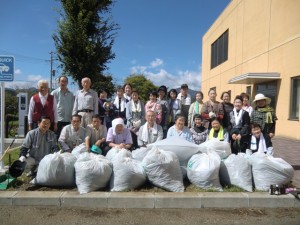Jonathan Kilworth, Business Intelligence Partner (Adults & Housing), Harrow Council (writing in October 2015)
There’s less than a month to go until we pack our suitcases for Japan, to take part in the Japan Study Tour (JST) organised by Japan Local Government Centre in London. Ten delegates from the UK are heading to Tokyo and Yamanashi Prefecture (famous for wine apparently, as well as Mount Fuji) to look at how local government there is handling the challenge of caring for an increasingly old and frail population. Japan already has more than a quarter of its population aged over 65 and the proportion is only going to increase. The UK isn’t quite so far along this demographic curve although the pressures are already being felt due to ongoing budget reductions in social care as well as the new obligations introduced by the Care Act.
I manage a small team of Business Intelligence analysts in Harrow, so I tend to focus more on numbers than on the specific content of social work interventions and initiatives. But as part of developing a better understanding of ‘what works’ the Japan Study Tour offers an opportunity to learn how local government there is coping with an increasingly ageing society by harnessing the power of local communities. In particular, dementia is one of the biggest challenges both our countries face. I’ve recently become a project advisor to a study of the Dementia Friends initiative, which will be identifying best practice in England and Japan. This study is being supported in the UK by the Alzheimer’s Society and has received recognition and support from the Government. Dementia Friends are volunteers trained to help people living with the condition during everyday life, often in small ways. This might be by showing patience towards an older customer encountered at work, to regularly contacting someone you already know with dementia, to campaigning and volunteering more widely. The idea is that by building awareness and an informal support network ‘out there’ in the community, the lives of people living with dementia should become a little bit easier. There are 6.3 million registered Dementia Friends in Japan and already 1.2 million in England, with the programme expanding to the rest of the UK, Australia and Canada.
It won’t be my first visit to Japan. I was able to see Japanese local government in action firsthand back in 2013 when I got married there. At both city and local ward offices, the efficiency and professionalism of staff, the sheer accuracy of advice given (without needing to “check and call you back”) was impressive. While on an extended holiday, I was fortunate enough to be able to make brief visits with an academic friend to a local authority in Kyoto and was able to witness some of the community based health promotion programmes offered.
In the early morning, local residents gathered in a university sports hall and were put through a series of exercises to music which left me out of breath and struggling to keep up. Although designed to build and maintain physical and mental flexibility (e.g. memorising the steps) I got the impression the programme was popular with participants more for the opportunity to meet up with friends and members of their local community. As one man said to me – “I wouldn’t have been comfortable doing this many years ago, but now I’m too old to be embarrassed!”. Although appealing more to women more than men, it had succeeded in drawing in residents ranging from sprightly sixty year olds through to women still going strong in their nineties. While not necessarily ‘better’ than anything being done in the UK, it was nevertheless a very positive group and I could see how much people appreciated it. I wondered whether such shared activities in a social setting might be more important to older people in Japan than in the UK.
I also attended a ‘train the trainer’ session at the same university with residents learning how to train volunteers in their local areas to help support elderly residents. In attendance were a group of 20 or more local people, mostly of middle age. Following a rather academic lecture on the issues an ageing society faces, a series of ice-breaking activities got underway. Requiring only minimal language skills, I was encouraged to join in. Initially rather formal and reserved, the group warmed up through a series of increasingly wacky exercises that got us talking, interacting and laughing together. The leader, an academic at the university possessing astonishing energy and enthusiasm, demonstrated great skill in working the room, explaining that it was hard work getting volunteers to take part so it had to be a fun experience. The activities we had just gone through were in fact the first part of the training programme that they, as volunteer trainers, were urged to follow in their local groups. I felt like I was watching the beginnings of an initiative that could have the potential to better support older people in their communities before formal care services were needed and might indeed delay the need for such provision. Moving on to the more practical content of the training, it was time for me to move on also.
I’ve never forgotten about that day and following further visits to academic colleagues in Japan last year, I’m very much looking forward to seeing how Yamanashi Prefecture is managing its own programmes of support, working with the community to harness the best of the enthusiasm and energy of local people. Japan as a country has already gone through some experiences the UK is facing in its future, so whatever we can learn and adapt from what works there may leave us just a little bit better prepared.
Jonathan Kilworth is one of 10 UK local government professionals who travelled to Tokyo and Yamanashi Prefecture in November 2015. JST is an annual study tour for public sector professionals. Expenses covered by JLGC and partner organisations during the tour period in Japan include transportation within Japan, accommodation, meals, seminar materials, admissions, and overseas travel insurance. Participants must cover the cost of return flight to Japan. Details of JST are updated HERE every year in the spring. Please contact mailbox@jlgc.org.uk for more details and terms and conditions.



